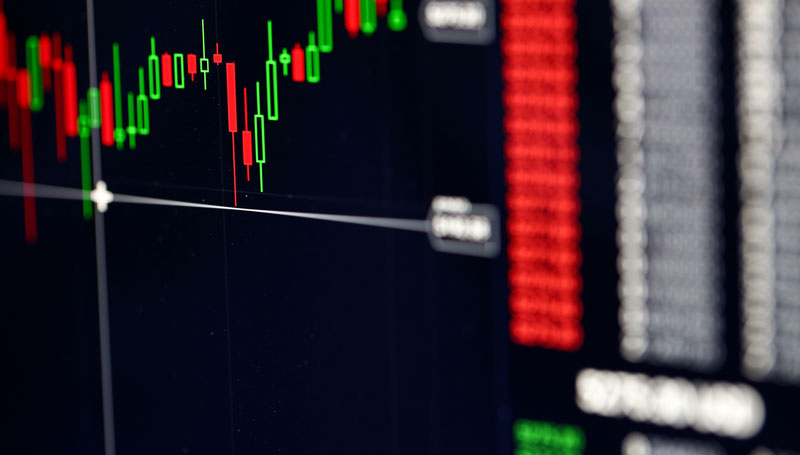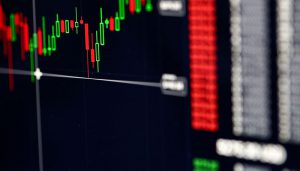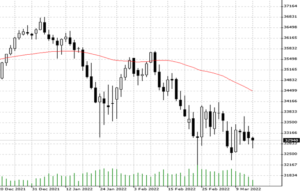

15.03.2022 – There is still the threat of an intensification of the economic war against Russia. Or the extension of Western sanctions to China. The Corona consequences have not yet been eliminated. Already, a global recession seems as certain as the Amen in the church. Let’s let a perma-bear have his say today.
Credit is cracking
Michael Hartnett, a strategist at Bank of America, recently warned that the corporate bond market is drying up. In other words, companies are getting less and less money in the market. This is a harbinger of a severe recession, which, according to Hartnett, will occur in the second half of the year at the latest. We think: That could mean toppling banks and teetering companies, plus falling corporate profits because people aren’t spending their money for fear of unemployment. This is not a good omen for the Dow Jones, for example, which we see here in the daily chart – it continues to trade below the 50-day moving average.

Previously, Hartnett had already addressed the scenario of a world at war. According to him, the war in Ukraine means a larger inflation shock, a smaller rates shock, and a more severe recession shock. The Federal Reserve and the European Central Bank are hopelessly caught between deflation on Wall Street and inflation on Main Street.
Loud warning signs
Mega-bear Hartnett sees a lot of troubling signs. Such as: Emerging market debt, China credit, China tech, biotech, forex. His antidote: “we are short tech, credit, private equity as era of excess QE over; we are long volatility, high quality, defensives on recession risk; we are long oil, energy, real assets on inflation; dislocation to financial plumbing delays entry to postponed reopening China/Asia/EM credit on (very) distressed yields.”
Of course, equities would not dive south unchecked – any news of a de-escalation in Ukraine would trigger a fierce bear market rally. But that would hardly change the long-term picture.
Stagflation ahead
Goldman Sachs, by the way, recently put the risk of a U.S. recession in the medium term at 35 percent. The investment bank pointed to the high oil prices and the collateral damage from the Ukraine war. Now the story on Wall Street has changed from reflation to stagflation.
Our conclusion: keep an eye on the real-time news. Much, if not all, now depends on the Federal Reserve in the short term. If it postpones rate hikes in light of the various crises, the stock market should cheer. Bernstein Bank is keeping an eye on the situation for you!
Important Notes on This Publication:
The content of this publication is for general information purposes only. In this context, it is neither an individual investment recommendation or advice nor an offer to purchase or sell securities or other financial products. The content in question and all the information contained therein do not in any way replace individual investor- or investment-oriented advice. No reliable forecast or indication for the future is possible with respect to any presentation or information on the present or past performance of the relevant underlying assets. All information and data presented in this publication are based on reliable sources. However, Bernstein Bank does not guarantee that the information and data contained in this publication is up-to-date, correct and complete. Securities traded on the financial markets are subject to price fluctuations. A contract for difference (CFD) is also a financial instrument with leverage effect. Against this backdrop, CFD trading involves a high risk up to the point of total loss and may not be suitable for all investors. Therefore, make sure that you have fully understood all the correlating risks. If necessary, ask for independent advice. CFDs are complex instruments and are associated with the high risk of losing money quickly because of the leverage effect. 68% of retail investor accounts lose money trading CFD with this provider. You should consider whether you understand how CFD work and whether you can afford to take the high risk of losing your money.7
